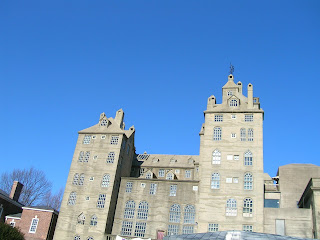As both supporters and naysayers agree, president-elect Obama is bringing a new intellectualism to Washington, a natural aristocracy that would warm Thomas Jefferson's heart. The Post's article notes the staggering numbers of Obama's appointments thus far that went to the nation's top universities. There is some debate, despite the debacle of the leadership of eight years of an unintellectual president and his cronies (most of whom, the Post notes, didn't go to great schools), over whether staffing the administration with the intelligentsia is a great idea. As one libertarian law professor noted, "These degrees confer knowledge but not judgment. Their heads are on grander themes . . . and they'll trip on obstacles on the ground."
As a "leftist academic" in training, I am puzzled by the idea that higher education teaches knowledge rather than judgment. In the humanities, our goal as PhD students is to learn how to think and where to access information, not to memorize all there is to know. We learn to evaluate claims and the best ways to prove an argument. These logical reasoning abilities, which are similar to those taught in law schools, should equip people well to serve in government. As for the idea that academics have their heads in the clouds, it is true that some academics deal with the theoretical rather than the realities on the ground, but these don't tend to be the people that enter public service. Even so, having some visionaries in the mix could help policy makers see the bigger picture and the implications of their decisions--things to which this administration has been obscenely blind.
The question all of this leaves me with, actually, is whether this is my time, too. Legal, economic, and policy scholars are obvious players in politics, but what is the historian's role? This circles back to my perennial question about the usefulness of studying history. Here are a few places I'd like to see historians put to work:
- Department of Education: the analytical skills that history teaches should be better integrated into teaching; studies have shown consistently low levels of historical knowledge among American schoolchildren, leaving them ignorant of where we've been and how this can help guide where we're going
- State Department: the cultural diplomacy efforts coming out of State have been dismal and academic guidance about how to speak to people in different parts of the world is needed; foreign policy makers could also benefit from historical perspective
- Department of the Interior: since this department deals with Native Americans and arbitrates their claims--but has done so quite poorly--more historians are needed here as researchers and advisor
- Supreme Court: in a court where precedent is so important, why not appoint a legal historian (a person with a JD and a PhD) to the bench?






























 On the eve of my 25th birthday, I was thinking about what a woman my age would have been doing in the past--because she certainly wouldn't have been single and working on her PhD even 50 years ago. So, to put it in perspective:
On the eve of my 25th birthday, I was thinking about what a woman my age would have been doing in the past--because she certainly wouldn't have been single and working on her PhD even 50 years ago. So, to put it in perspective: